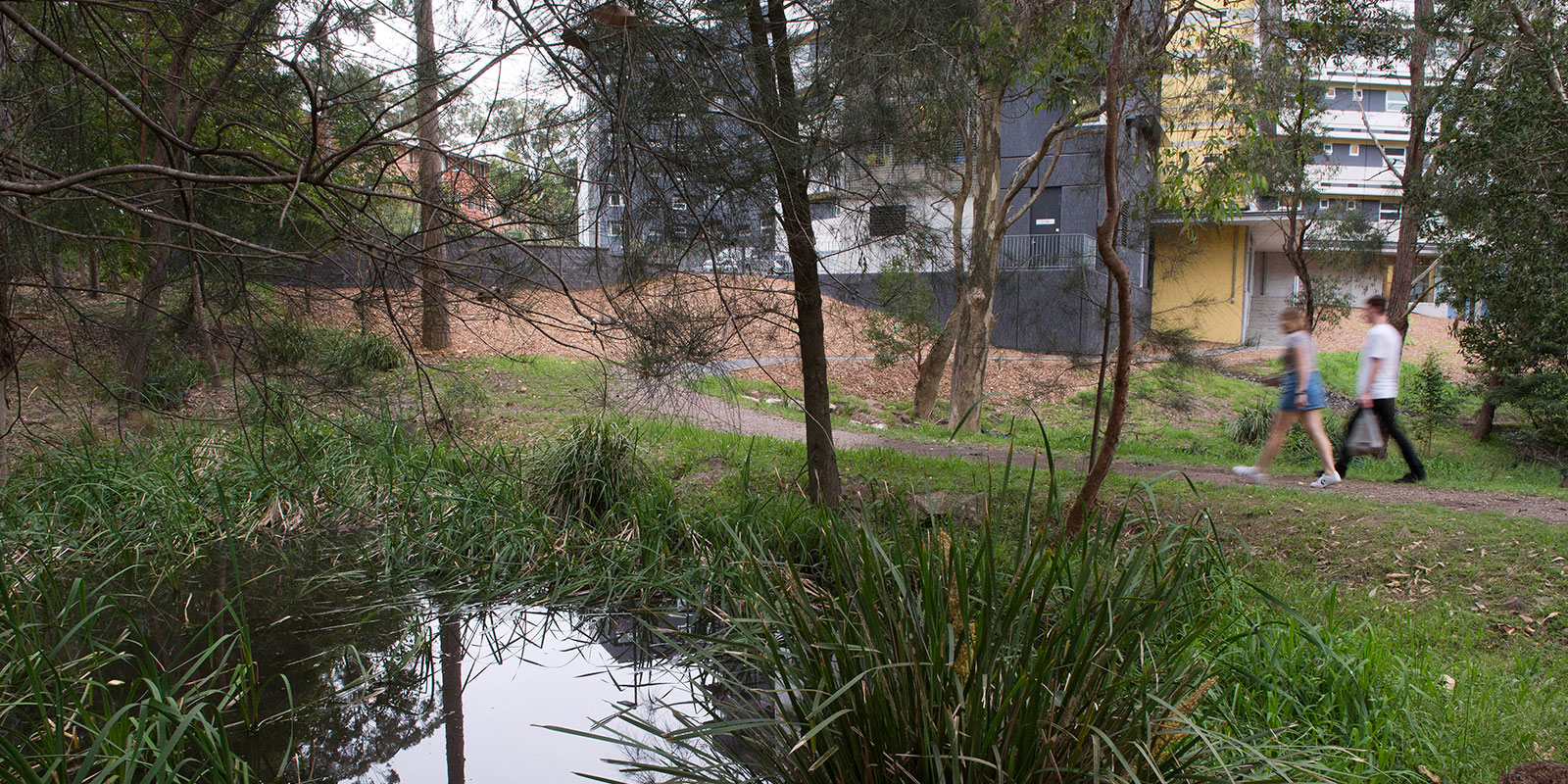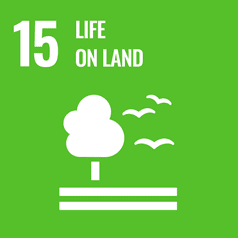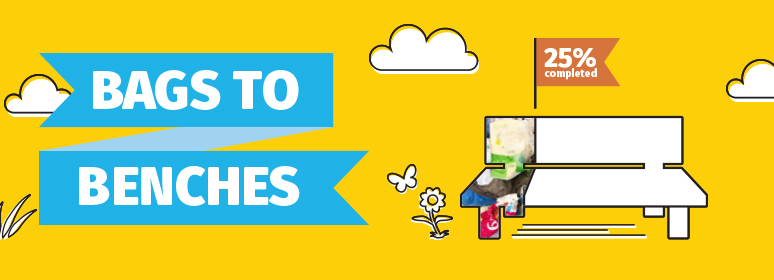

Goal 15:
Life on Land
Policy on Plastic Waste Reduction
The University of Newcastle’s Environmental Sustainability Policy explicitly commits to reducing plastic waste.
- Under Clause 12: Waste and Recycling, the Policy states that the University will “minimise the use of plastic and disposal items across our campuses”.
- This commitment is part of a broader pledge to establish and work toward a recycling target, educate our community about waste and recycling, and align preferred suppliers with sustainability goals.
This policy was effective from the 8th of December 2022, was operational throughout 2023 and 2024, and will be reviewed in December 2025.
Supporting Actions & Programs (2024)
- Plastic Free Campaign
The University runs an ongoing Plastic Free campaign that encourages staff, students, and vendors to shift away from single-use plastics. This includes initiatives such as introducing reusable container schemes, compostable alternatives, and removing single-use plastics from key areas by 2025. - Soft Plastics Recycling — Bags to Benches
Through a partnership with Plastic Police, UoN collects soft plastics (e.g. plastic bags, wrappers) and turns them into outdoor benches. This helps redirect plastic waste from landfill and gives it a functional second life. - Simply Cups Program
Disposable coffee cups are collected at campus Simply Cups recycling stations to be remanufactured into reusable cups or other waste‑derived products. - Procurement & Vendor Alignment
The University aligns its supplier selection with sustainability objectives, encouraging vendors to reduce plastic packaging, switch to compostable materials, and follow circular economy principles.
These policies and practices demonstrate the University’s commitment to reducing plastic waste — from policy through to concrete campus programs.
Plastic Free
Plastic presents an ever-growing challenge to our society and our planet. While improving the lives of many, rising plastic consumption is a growing threat to our global environment. Each year, the average Australian uses 130kg of plastic, with over 130,000 tonnes of this ending up in our waterways and oceans. This plastic may take hundreds of years to break down, without ever biodegrading. Microplastic particles remain in the environment, found inside plants, animals and people, with widespread negative consequences for biodiversity and health.

The Plastic Free logo draws inspiration from the University’s emblem and an endangered marine species - the White’s Seahorse (Hippocampus whitei), which is predominantly found in coastal waters off Sydney and Port Stephens. Although White’s Seahorse has the remarkable ability to change colour and camouflage with its environment, one thing it cannot hide from is plastic pollution. Many of the plastic products we throw away wash into our oceans, wreaking havoc on marine life through ingestion and entanglement. By reducing our reliance on plastic, we can help to protect and regenerate these vital ecosystems.
A key component of plastic over-consumption is single-use items. These items are generally thrown away after one use, made from fossil fuels and produced in offshore locations. Some common single-use items include:
- Plastic shopping bags
- Plastic cutlery and straws
- Plastic packaging
- Plastic bottles
- Plastic takeaway food and drink containers
Plastic Free is an ongoing campaign designed to support our staff, students and community in a shift away from single-use plastic to more sustainable alternatives. Our goal is to remove single-use plastic products from key areas on campuses by the end of 2025. We are working with our partners and community through staged education and collaborative initiatives on campus, including:
- Introduction of reusable container schemes and compostable takeaway food packaging at food outlets
- Transition to plastic-free products and compostable stationery at retail stores
- Removal of single-use plastic at University-catered events
- Participation in circular economy schemes that minimise new plastic consumption
On-campus retailers can download the Plastic Free guide for more information.
The University is aware, supportive and encourages the ban of certain single use plastics as of 1 November 2022. This includes the additional single use plastics that will be banned from 1 January 2025.
We encourage all vendors and retailers to comply with the Plastic Reduction and Circular Economy Act 2021,
Further guidance can be found here - Plastics bans guidance (nsw.gov.au)
Waste and recycling
Plastic and waste products present an ever-growing challenge to our society and our planet.
As outlined within our Environmental Sustainability Plan (2019-2025), the University has a soft plastics recycling program in partnership with Plastic Police, which turns plastic bags into benches providing added outdoor seating across campus. The program has collected and recycled over 362,500 pieces of soft plastic to date.
Plastic Free is an ongoing campaign designed to support our staff, students and community in a shift away from single-use plastic to more sustainable alternatives. Our goal is to remove single-use plastic products from key areas on campuses by the end of 2025. We are working with our partners and community through staged education and collaborative initiatives on campus, including:
- Introduction of reusable container schemes and compostable takeaway food packaging at food outlets
- Transition to plastic-free products and compostable stationery at retail stores
- Removal of single-use plastic at University-catered events
- Participation in circular economy schemes that minimise new plastic consumption.
See our Plastic Free Guide for tips and tricks.
Sustaining your coffee addiction
Did you know that 2,700,000 coffee cups are thrown out every day?
When thinking about your morning coffee habit, there’s a few things you can do to reduce your waste, including:
- BYO cup (and enjoy a discount from many of our campus retailers).
- ‘Hug a mug’ - borrow a mug from one of our coffee retailers such as Aroma Café (Hunter building) and receive a discounted coffee.
- Find a Simply Cups recycling station on campus and flip, tip, slip! See a map of locations.
Not near a recycling station? Don’t fret. Separate your cup and lid – lids go in the nearest yellow recycling bin, and cups in a red landfill bin.
Our recycling measures are part of our waste recycling target set in our Environmental Sustainability Plan (2019-2025).

The University will continue its partnership with the Plastic Police in the successful Bags to Benches initiative. This sees the transformation of soft plastics recycled by staff and students across the university into outdoor benches on campus, embodying circular economy principles to recirculate materials and minimise waste. To find out where you can recycle your soft plastics at Callaghan, visit the campus map.
Bags to benches
In an effort to address the issue of soft plastics that are polluting local land and marine environments, UON has joined the Plastic Police® program currently being piloted in the Hunter region. Through the program, UON will be collecting soft plastics which will be recycled into outdoor benches.
“The Bags to Benches program is great way to give this important issue visibility,” Environmental Manager, Daan Schiebaan said.
“The response to program has been extremely positive – just three weeks in and we are 25% of the way toward making our first seat,” Daan said.
The University’s soon-to-be-released Environmental Sustainability Plan has a target of achieving a 70% recycling rate for general solid waste generated across the University by 2021.
“The support for the Bags to Benches program is a good sign that we will be able to achieve the behaviour change we need to achieve our target,” Daan said.
Staff can drop their soft plastic rubbish at collection points at Callaghan, located within Student Accommodation Precinct, Auchmuty and Huxley libraries as well as the NUSA and Services Buildings.

The University of Newcastle acknowledges the traditional custodians of the lands within our footprint areas: Awabakal, Darkinjung, Biripai, Worimi, Wonnarua, and Eora Nations. We also pay respect to the wisdom of our Elders past and present.